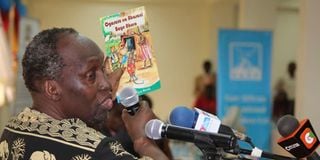Teach our local languages up to university

Prof. Ngugi wa Thiong'o displays a copy of a story book written in vernacular to members of the public and students who attended his public lecture at Kisii University in this picture taken on August 31, 2015.
What you need to know:
- Unesco and the World Bank concur that mother tongue is the best medium in early school learning.
- Local languages boost teacher-student communication.
There are 42 local languages in Kenya. The most dominant foreign language is English, an official language alongside Kiswahili, the national one. Foreign languages are mainly used by minorities and in offices and institutions.
In primary school, the examined languages are English and Kiswahili but in secondary school there are English, Kiswahili, Arabic, French, Kenyan Sign Language (KSL) and German.
In the rural areas, where pupil walk to school daily, mother tongue is taught in the lower classes. But in upper primary, only English and Kiswahili are used.
Most young people nowadays are not taught mother tongue at home while for others, their parents come from different ethnic communities. Many youth are not fluent in the languages they speak.
Local languages have many advantages. Among them, the student will know their languages and identify with them and also know their cultures. They can teach at the university or become translators in organisations such as the courts, interpreters, book writers, teachers and linguists.
The learning of indigenous languages improves student’s educational outcomes, as well as much broader beneficial effects on the society. Embassies can employ them to teach diplomats and foreign students.
Secondly, it will improve early literacy outcomes in primary school. Recent research shows most pupils entering Grade Four have below-par literacy skills due to their premature introduction (especially those from rural areas and informal settlements) to the English medium of instruction.
Unesco and the World Bank concur that mother tongue is the best medium in early school learning and also sociologically, psychologically and educationally for children entering primary school. With the inclusion of indigenous languages in the new Competency-Based Curriculum (CBC) will also help to save languages from extinction.
Boost communication
Local languages boost teacher-student communication. Learners are taught from the known to the unknown and can understand instructions faster. Students have a sense of belonging as it is their language being used, thereby making reading easier.
They can more easily find their way around towns and cities and seek help. Knowledge in speaking, reading and writing in their own language makes them adapt to their local surroundings as they can read signs, warnings, labels and directions.
The student-centred CBC’s mission is to nurture every learner’s potential and promote social, economic, technological and industrial needs. The learner will embrace positive cultural practices in a dynamic society.
A student’s interests, talents and character for positive contribution to the society will drive learning for sustainable development.
It is prudent that local languages be taught and examined in secondary schools and universities.
Ms Onjoro is a PhD student at Mount Kenya University, author, lecturer, publisher and motivational speaker. [email protected].





